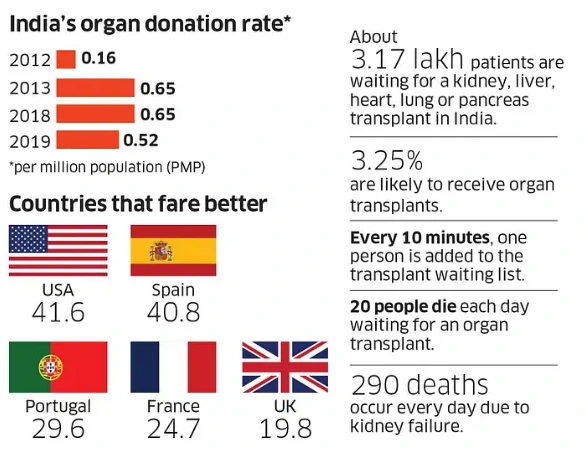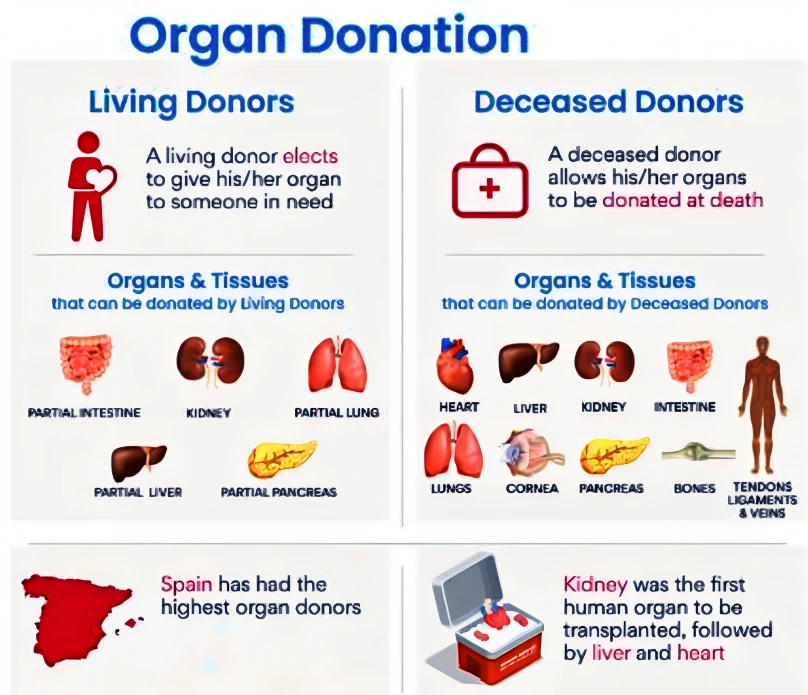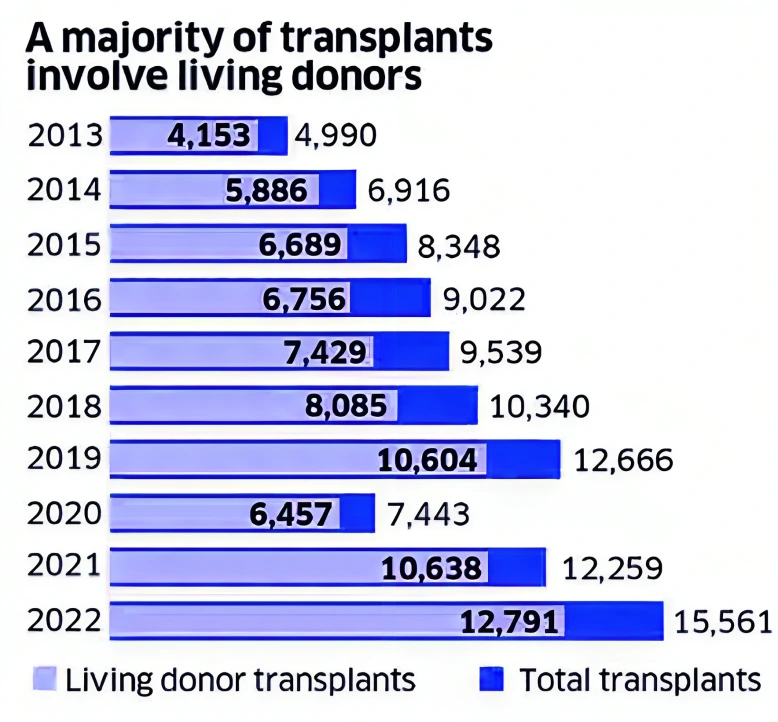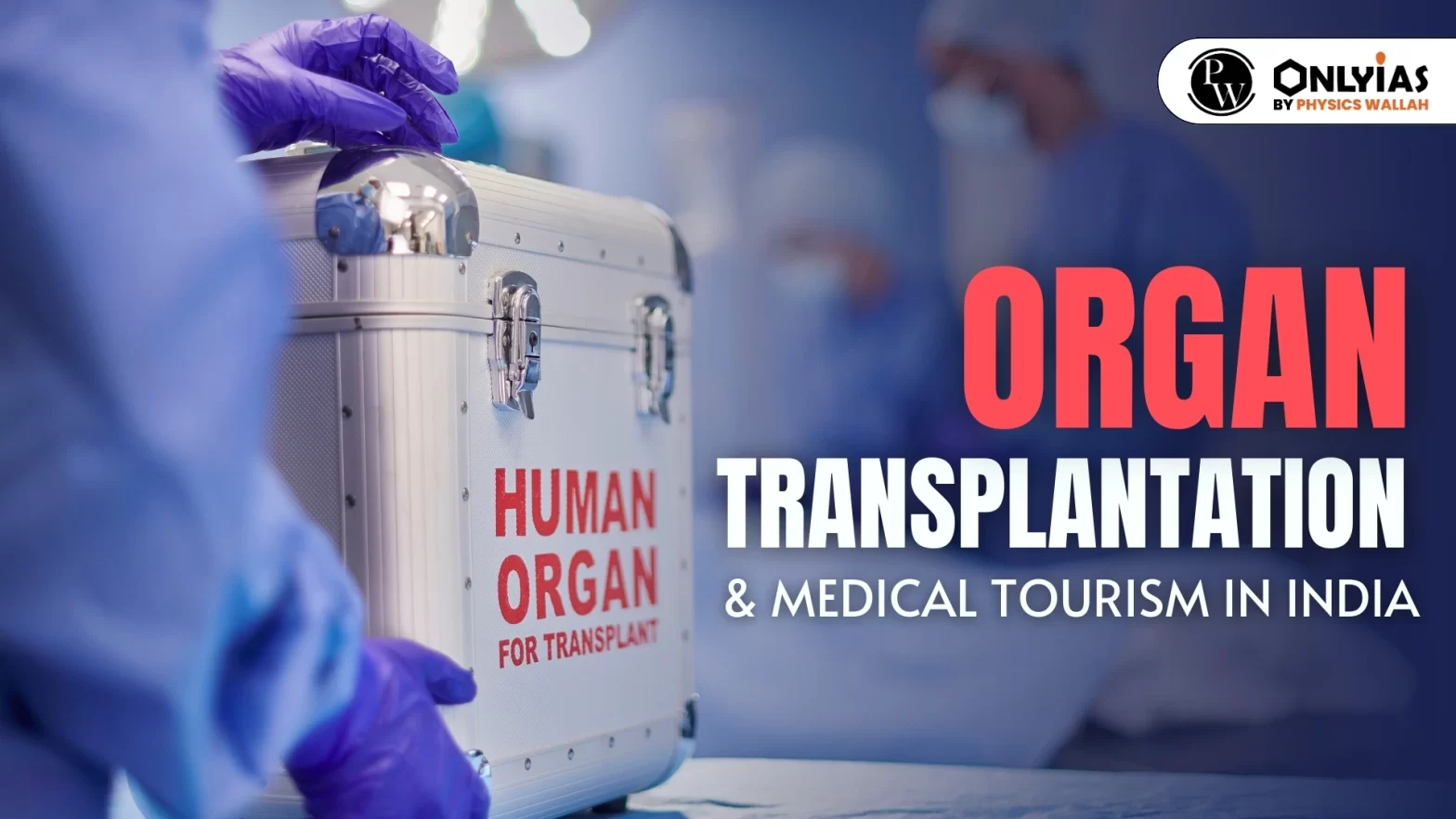Context: This article is based on the news “The flipside of medical tourism — organ transplant rackets” which was published in the Indian Express. There is frequent news in the media on organ transplantation, ranging from uplifting stories of donors saving lives or disheartening stories, like scandals where organs are bought from vulnerable individuals.
| Relevancy for Prelims: Organ Transplants, World Health Organization (WHO), Indian Organ Donation Day, National Organ Transplant Programme, and National Organ & Tissue Transplant Organization (NOTTO).
Relevancy for Mains: Organ Transplantation & Medical Tourism In India: Statistics, Reasons for Increasing Medical Tourism In India, and Challenges Associated with Organ Transplants in India. |
Statistics on Organ Transplantation & Medical Tourism In India

- India’s Position in Organ Transplants: According to the Global Observatory on Donation and Transplantation (GODT), India ranks 3rd in the world and is only behind the USA and China.
- In India, the organ donation rate has increased to about 4 times as compared to 2012-13. However, only 0.65 organ donations per million population occur in the country.
- Organ Transplants in the World: According to the World Health Organization (WHO), about 1,00,800 solid organ transplants are done yearly, most of which are liver and kidney transplants.
- Increase in Organ Transplants in India: Transplantation has grown exponentially in India, largely in the private sector. According to the Union Health Secretary, there has been a fast resurgence in organ transplant activities post-COVID.
- For the first time, India has achieved more than 15,000 transplants a year (2022) and an annual increase of 27% in the transplant numbers.
- Gender Inequality: For every woman who received an organ, four men got transplants in the country. Data from 1995 to 2021 shows 36,640 transplantations were carried out, of which over 29,000 were for men and 6,945 were for women.
About Organ Transplantation

- Organ transplantation: It is the act of surgical removal of an organ from one person and placing it into another person. It is a life-saving therapy for end-stage organ failure.
- 1st successful Organ Transplant: The world’s first successful organ transplant was kidney transplantation, which was undertaken in Boston, USA in 1954.
- The first kidney transplant in India was performed in 1971 at Vellore, Tamil Nadu.
- Organ Donation: It means giving part of the body (organ) to a person with end-stage organ disease requiring a transplant.
- Organ: An organ is a body part that performs a specific function. For example, heart, lungs, kidney, liver, etc.

Must Read: Organ Donation Policy
Reasons for Increasing Medical Tourism In India:
- Best-in-Class Healthcare Facilities: Transplants need well-trained personnel, technology, advanced intensive care, and institutional drive for good outcomes, and these conditions were met by an expanding private sector.
- Many countries in Asia and Africa have not been able to develop transplant facilities hence, patients from other countries utilize India’s healthcare expertise.
- Internationally Recognized Educational Credentials: In India, not just the doctors but also caregivers and nurses are highly trained and experienced. The standard of their education and training is at par with international standards.
- Thriving Pharmaceutical Industry: Apart from hospitals and doctors, India emphasizes manufacturing drugs that are a necessary part of the surgery and recovery phase.
- For example, to prevent rejection of the organ by the recipient’s body, anti-rejection drugs are administered.
- Affordable Procedures: The cost of living in India is cheaper than in most Western countries. India offers affordable options for accommodation, making it the preferred transplant tourism destination.
- Organ transplants require a patient to stay in the hospital for a long duration. Even after the transplant, patients are required to visit the hospital frequently. Hence, living near the hospital is an advantage and promotes quick recovery.
Challenges Associated with Organ Transplants in India
- Unethical Organ Trading: The trade of human organs is a long-standing and widespread occurrence. Most countries around the world, including India, have declared it illegal. However, organ trade persists due to the high demand and a society where body commodification has become normal.
- For example, a Kolkata hospital was in the news recently as street children from Nepal were lured as kidney donors for wealthy Indian and foreign patients.
- Affordability Dichotomy: Organ Transplantation in India is relatively cheap for foreigners compared to the rest of the world, though it continues to be costly for ordinary Indians.
- High Discard Rate: According to the National Organ and Tissue Transplant Organisation, hundreds of organs such as heart, lungs, and liver donated by the deceased in India are being discarded even after families of the deceased volunteered to donate them.
- Organ Shortage: The gap between demand and supply of organs continues to widen worldwide, encouraging transplant commercialism. The organ shortage problem continues, even in nations whose healthcare systems are far better equipped than that of India.
- India conducts the 3rd highest number of transplants in the world every year. Yet barely 4% of the patients who require a liver, heart, or kidney transplant manage to get one.
- High Gender Disparity Among Donors: A paper published in the Experimental and Clinical Transplantation Journal in 2021 found that 80% of the living organ donors are women, mainly the wife or the mother, while 80% of the recipients are men.
- Vulnerable Trust-Based Donation System: The project of deceased donation after death is dependent on high levels of trust in the transplant system. However, healthcare trust is rapidly under threat as news of a large number of foreigners getting transplants over locals,
- Grim Picture of Medical Tourism for Transplantation: Patients are very sick and travel to a foreign country with an alien language and culture with the biggest challenge of accessing voluntary donations.
- Post-Operation Care: Care of transplant patients doesn’t end with the operation. Both donor and recipient need close follow-up.
Government Initiatives Related to Organ Transplants
- The Transplantation of Human Organs (Amendment) Act, 2011: It has taken multiple measures to combat organ and tissue commerce and as a result, the number of such instances seems to be on the decline.
- Transplantation of Human Organs & Tissues Rules, 2014: These rules were implemented after the amendment to the act was passed by the parliament in 2011.
- National Organ & Tissue Transplant Organization (NOTTO): NOTTO is a National level organization set up under the Ministry of Health & Family Welfare.
- National Network division of NOTTO functions as the apex centre for coordinating all activities and networking for the procurement & distribution of organs & tissues and maintaining a registry of organs & tissue donation & transplantation in the country, through the Regional Organ & Tissue Transplant Organization (ROTTO) and State Organ & Tissue Transplant Organization (SOTTO).
- National Organ Transplant Programme: Introduced for carrying out the activities such as training of manpower and promotion organ donation from deceased persons.
- One Nation Organ Donation Policy’: It is aimed at encouraging and standardizing voluntary organ donations in India.
|
Also Read: Unveiling India’s Kidney Transplant Crisis: Challenges and Solutions
Way Forward
- Communication: India has a growing geriatric population and to ensure quality of life for them, it is critically important to update the communication and awareness strategy, so that potential organ donors come forward.
- Indian Organ Donation Day is being celebrated on August 3 to commemorate the first successful deceased heart transplant in India on 3rd August 1994 to spread awareness among people and to recognize the selfless efforts made towards mankind and re-establish belief in humanity.
- Capacity Building: Despite having more than 640 medical hospitals and colleges, transplants remain a specialized service limited to some hospitals. There is a need to expand the number of institutions where surgeries and transplants are undertaken.
Changes in India’s Organ Donation and Transplantation Rules
- The Health Ministry has made three big changes to India’s Organ Donation and Transplantation rules.
- Changes were notified by the National Organ and Tissue Transplant Organisation:
- The age limit for organ transplantation has been removed.
- The domicile criteria that states followed for organ transplantation have been removed.
- The registration fee has been eliminated.
|
-
- Further, the creation of centres of excellence at the State and regional levels where these specialized services can be provided to the needy.
- Increasing the Pool of Organs: The opt-out system which assumes all citizens to be donors unless they “opt-out” may be apt for a country such as India, complemented with awareness of organ donation.
- Transplant Tourism: There is a need for healthcare providers, health organizations, and governments to establish clear policies to avert unethical practices associated with transplant tourism.
- Reducing the demand for Organ Transplantation: The main program to reduce the demand includes the National Program for Prevention and Control of Cancer, Diabetes, Cardiovascular Diseases, and Stroke.
- Further steps are needed for prevention and control of the diseases that cause organ failure e.g. Diabetes, Hypertension, Alcoholic and non-alcoholic Chronic liver diseases, etc.
- Streamline Nationwide Implementation of Green Corridor: A ‘green corridor’ is a special route that is managed in a way that all the traffic signals that come in the route of the hospital where an organ is harvested and the hospital where it is to be transplanted, are green and controlled manually.
- In India, Chennai was the first city to incorporate this concept. This concept can be used at the pan-India level to ensure a timely supply of vital organs.
Conclusion:
Medical tourism in India, particularly in organ transplantation, has become a significant revenue source for private hospitals in India. According to the Global Observatory on Donation and Transplantation (GODT), India is the third-highest country in the world for organ transplantation, following only the USA and China.
![]() 16 Dec 2023
16 Dec 2023



